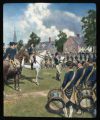
Middle of the Atlantic Ocean
December 1st, 1778
Commodore John Paul Jones enjoying his job as an officer of the Continental Navy, but he had to admit that he hated the cold. Why he wanted to travel to Russia out of all places in the other history was beyond him, even if they offered him a position in the navy unlike the United States of the other history. But in this world, he was considered one of the highest-ranking naval officers of the United States and was escorting merchant ships to Europe. The war against Britain was over, but there were plenty of privateers and pirates that attempted to raid American ships thinking that the United States had little power to stop them. It was his job to command the USS Bermuda and to prove them wrong.
His ship and two Continental Frigates (the USS Bunker Hill and the USS Benedict Arnold) were escorting about six merchant ships that were traveling from New York to France for trade. He had carried out two escort missions so far, and both of them were rather uneventful except for a few armed exchanges against pirate ships. The merchant ships carried valuable shipments of steel, metal goods, and luxury goods to sell to France. As such, Commodore Jones was on heightened alert to escort these ships to France safely. The last thing he wanted was to be caught by surprise and lose his warships and merchant ships.
Suddenly, one of his lookouts shouted at him, "Commodore, we have a few British ships off in the distance!"
The officer took out the binoculars that were gifted to him by Samuel and looked off into the distance. Sure enough, there were six ships flying the British flag, though it seemed like only three of them were warships. However, the British ships were moving towards them and it seemed as though they were attempting to intercept them directly.
"Maintain our speed, but turn slightly southward. I want to see what those ships want with us."
After signaling to the other American ships, the USS Bermuda followed the commodore's commands and moved slightly off course from their original route. An hour later, it was evident that the British ships were still tailing them for some odd reason.
Now he had to make a choice; would he slow down to face the British ships or continue to set sail for France?
USS Bermuda was a fourth rate ship but was noticeably slower than the frigates and the merchant ships. As a result, the other ships were moving slower than their fastest speeds to match with the USS Bermuda's speed. From what Commodore Jones saw, the British ships were noticeably faster and all of them were smaller than the USS Bermuda. It would take some time for them to catch up, but they would catch up eventually. And the last thing he wanted was the merchant ships to be caught in a potential firefight.
"Signal to USS Bunker Hill to take the merchant ships and continue its journey to France. The USS Benedict Arnold and the USS Bermuda will make a stand and fight."
Three hours after the USS Bunker Hill and the American merchant ships departed, the British ships were finally upon the two American warships. Judging by the size of the British ships, the commodore guessed that the convoy was made up of three frigates and three merchant ships. However, he waited for the British ships to open fire first, as the United States and Britain were technically at peace.
When the first shots from the British ships landed in front of his ship, Commodore Jones gave his orders, "Fire!"
The USS Bermuda was refitted with six 6-pounder rifled cannons to replace the four 6-pounders on the quarterdeck. Three of them opened up on the British ships, along with the other twenty cannons on the port side. Several of them landed directly on one of the British frigates, while shots from the USS Benedict Arnold also poured onto the British ship.
After four hours of relentless combat, the British ships finally conceded and fled towards the west. One of the British frigates was sunk, while the surviving British ships were all damaged to various degrees. The USS Bermuda and the USS Benedict Arnold were damaged, but stable enough to continue its voyage to France. However, two of the British merchant ships were stranded in the water due to the loss of their masts. The American ships descended upon them and captured them as their prizes.
Commodore Jones stepped onto the captured ships and spoke with the captain in charge of the ships, "Why did your ship and the other British ships attack us? Are you not aware that there is peace between the United States and Britain?"
The captain grimaced and nodded, "I was aware, but we were being escorted by privateers who were formerly Loyalists in South Carolina. We were traveling to the Caribbean to sell slaves in Jamaica, as it was recaptured four months ago. However, the Loyalists on the other ships wanted to engage your ships as an act of revenge for their losses in South Carolina. We had little choice in the matter, as they were our escorts and the waters around here are dangerous to regular merchant ships."
"Slaves?" Commodore Jones frowned, "You have slaves on the two ships?"
"Yes, about three hundred on each ship."
"Inspect the slaves and provide them any provisions for them," Commodore Jones retorted to one of his crew members, "We will be sailing back to Bermuda."
"Where will these slaves go from there?"
"I have a friend in New York who can help us in that regard. They'll be freed once we return."



Nice!